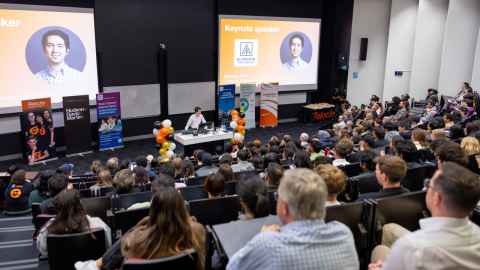Bowen Pan: Why ‘go big and go home’ is the future of innovation in New Zealand
09 June 2025
It’s a special kind of homecoming when a former student returns not just as a guest, but as a keynote speaker.

For Bowen Pan, this moment marked the full circle of a two-decade journey: from pitching a rough idea as a student to shaping global tech products in Silicon Valley, and now, coming back to Aotearoa with an unwavering belief in its potential.
Velocity is New Zealand’s leading university entrepreneurship development programme, delivered through the University of Auckland Business School’s Centre for Innovation and Entrepreneurship (CIE). At the recent 2025 Velocity Ideas Challenge Prizegiving event, Bowen took the stage to reflect on his career path and deliver a rallying message to the next generation of innovators: you can build big and you can do it from home in New Zealand.
A spark that ignited a journey
Nearly 20 years ago, Bowen sat in the same seats as this year’s participants. A university student with a wild idea. The competition was called the Spark 40K Challenge back in 2006, now the Velocity $100K Challenge, and his pitch, uniFriend, was a social networking site for students. It didn’t take home the prize, finishing as runner-up, but it planted the seed for everything that followed. That early experience gave Bowen the confidence to keep building. He later joined the Velocity student organising team, and after graduating, went on to launch and scale products across New Zealand, Asia, and the United States.
Today, Bowen is a proud CIE alumnus whose career reads like a masterclass in global innovation leadership. As the founder of Facebook Marketplace, he conceptualised and championed the idea and scaled the platform from scratch to over 800 million monthly active users. He went on to build Facebook Gaming, launch Stripe Apps, and then serve as Vice-President of Product at Common Room, where he helped supercharge sales for leading tech companies like Rippling, Grammarly and Notion. Having recently moved back to New Zealand with his young family, he continues to shape the future of tech as a board member, adviser and investor to high-impact companies and venture capital firms.
Start small, think huge
Bowen challenged the romanticised view of start-ups: that success requires perfect ideas, crisp strategies, and ideal conditions.
“In reality,” he said, “you start with blurry ideas, duct-taped prototypes, and a ton of uncertainty.”
He pointed to real-world examples. Facebook Marketplace began as a three-day hackathon project. Stripe Apps emerged from watching developers cobble together their own tools. Instagram Reels was born out of a failed product. None of them began with clarity, but all succeeded through rapid iteration and relentless learning.
“These weren’t polished visions,” Bowen said. “They were scrappy insights, executed fast.”
Ambition attracts momentum
“Big things start small, but if you’re going to pour years of your life into something, it should have the potential to matter.”
Bowen says the effort required to serve 100 people isn’t that different from serving 100 million. From his experience, big ideas attract top talent, investment, and customer enthusiasm. It’s not about perfection, it’s about obsession with the problem and world-class execution.
Bowen encouraged the students to pursue ideas that could redefine entire categories.
“Give yourself permission to dream at scale, that ambition is magnetic.”
You don’t have to leave to matter
Perhaps the most resonant message of the night: “You don’t have to go big or go home, you can go big and stay home….so you don’t have to leave to start changing the world. You just have to aim higher.”
He pointed to a wave of Kiwi-led ventures that are redefining global industries:
- Rocket Lab has made New Zealand a top-four nation for space launches.
- Halter is revolutionising agriculture through smart livestock technology.
- Crimson Education is a global leader in elite university admissions.
- Auror helps the world’s biggest retailers – like Walmart – stop crime before it happens.
- Partly powers how everyone from eBay to mechanics finds and buys car parts.
- Tracksuit makes brand tracking possible for anyone, not just reserved for the likes of Coca-Cola and Unilever.
“These aren’t just world-class companies, they’re world-leading and built right here. For me, Velocity wasn’t just a student competition. It was the first time someone said, ‘Hey, your idea might be worth something.’ And that belief matters.”
He urged the students to treat the night not as an ending, but as a beginning.
“Whatever you're working on, ask yourself: What if this could be the next big thing? Then try, iterate, learn, and execute.”
Many CIE alumni and spinouts are also shaping global markets. Toku and Kitea Health, both founded by CIE alumni, were recently recognised at the NZ Hi-Tech Awards for their pioneering work in medtech. Meanwhile, Kami is transforming digital classrooms for millions of students worldwide, and Wayve, an AI-driven mobility start-up, continues to push the boundaries of autonomous vehicle technology. These ventures reflect how the University of Auckland’s entrepreneurial ecosystem, including initiatives like CIE, UniServices and MedTech-iQ, is fostering world-class innovation and helping build companies with real global impact, right here in Aotearoa.
Bowen ended the night by reminding everyone that the next great company isn’t somewhere far off. It’s already in the room.
“And everyone including me is rooting for you.”